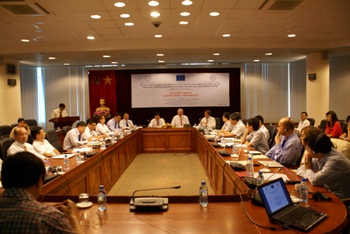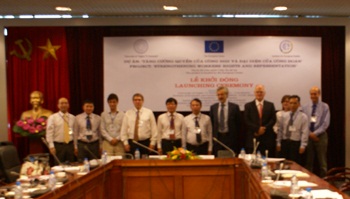On July 1st, 2013, the Institute of European Studies (under Vietnam Academy of Social Sciences) in cooperation with University of Naples “L'Orientale” (Italy) organized a launching ceremony for the “Strengthening Workers’ Rights and Representation” project.
 |
In attendance at the launching ceremony were: Prof.Dr. Nguyen Quang Thuan, Vice President of VASS; Mr. Franz Jessen, Ambassador and Head of the European Union in Vietnam; Mr. Lorenzo Angeloni, Italian Ambassador in Vietnam; and Mr. Mai Duc Chinh, Vice President of Vietnam General Confederation of Labour. Other key participants included representatives of project partners such as: Prof.Dr. Pietro Masina, University of Naples “L'Orientale”, Project Coordinator; Prof. Salvo Leornadi, Institute of Social and Economic Studies, Italian General Confederation of Labour (CGIL); Prof. Fernando Rocha, May 1st Culture Fund, CCOO General Confederation of Labour; Prof.Dr. Vu Quang Tho, Deputy Director in Charge of the Worker and Trade Union Institute; Dr. Pham Van Ha, Vice President in Charge of Vietnam Trade Union University; Assoc.Prof. Dr. Nguyen An Ha, Director of the Institute of European Studies. Some other agencies/organizations were represented at the launching ceremony, for example: institutions under VASS; International Labour Organization; Ministry of Labour, Invalids and Social Affairs, Vietnam Social Insurance; Vietnam Union of Science and Technology Associations; Vietnam General Confederation of Labour; and the Provincial Confederation of Labour in Hai Duong, Vinh Phuc, and Hanoi, where key project activities will be carried out.
 |
The “Empowerment of Workers and Trade Unions in Vietnam” project, funded by the European Union (EU) and carried out by the Institute for European Studies, European partnerships, and Vietnam General Confederation of Labour from 2009 to 2011 (Phase I), has achieved great success and many important results, offering useful contributions to both scientific studies and practical activities related to unionization. The results have shown that a very large proportion of Vietnam’s industrial workers lack knowledge on labour laws, and as a result their ability to protect themselves by claiming their legitimate rights in labour relations and making demands to the relevant representative organizations is still very limited. On the basis of these results, the EU has decided to continue to finance the “Strengthening Workers’ Rights and Representation” project into Phase II. The project is intended to promote and uphold previous achievements in workers’ rights and representation, and especially to implement those achievements in the context of actual union practices. With these objectives, the project in its second phase will promote the security of workers’ livelihoods and legitimate rights, and the efficiency of trade and labour union representatives’ operations.
Prof. Dr. Nguyen Quang Thuan, Vice President of VASS, underlined that the project will last for 30 months (beginning January 2013) and will work to enhance the capacity of Vietnam’s trade labour unions to represent workers and assist them in claiming their rights by establishing and operating legal advice centers in Vinh Phuc, Hai Duong and Hanoi. The project is expected to provide members of trade and labour unions with better legal advice and services, making relevant laws more accessible to workers and enhancing the capacities of local consultants.
At the ceremony, Mr. Mai Đức Chính, Vice President of Vietnam General Confederation of Labour said that by the end of 2012 Vietnam trade and labour unions had 7.5 million members and over 110,000 union branches based in all economic sectors. In fact, Vietnam is industrializing very quickly and has already become a new production center. Meanwhile Vietnam lacks strategic industrial zones, having only industrial zones of a general model with limited capacity and no cooperation with national research agencies. National and local industrial strategies are weak, while domestic companies integrate into value chains led by foreign companies with limited value added tax (VAT). Conflicts often occur at foreign-invested companies because of harsh working conditions and violations of workers’ legitimate rights. Workers in many foreign-invested companies can easily fall into poverty.
According to Prof.Dr. Pietro P. Masina, Project Coordinator, the project will strengthen the role of Vietnam’s trade and labour unions in two ways: i) effectively improving the usability of research tools to capture the needs and working conditions of workers, and ii) providing technical support for the operations of provincial-level legal advice centers. In the last ten years the role of Vietnam General Confederation of Labour has become more important and complex because of rapid changes in the economic and social context; thus, the project also contributes to the strengthening of the position of Vietnam General Confederation of Labour in debates on industrial policy issues, as well as its role in bringing voices from grassroots level to policy.
Many others of those in attendance actively participated in the discussions and exchanges of ideas, making comments/suggestions on the project. All of the comments/suggestions made were later assembled by the project coordination unit and incorporated into documentation of the project implementation process.
Nguyen Thu Ha







